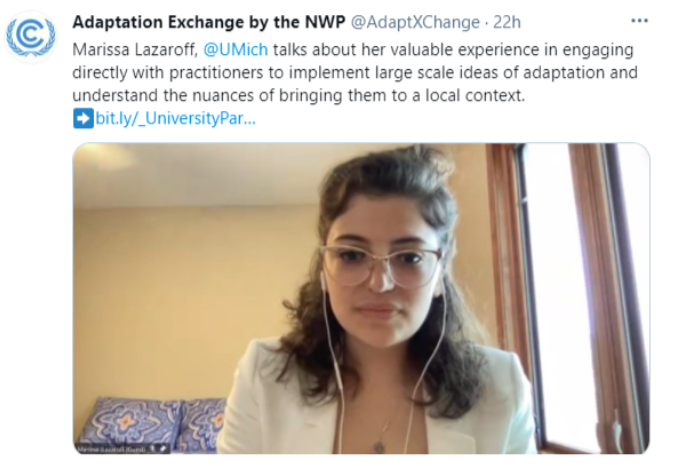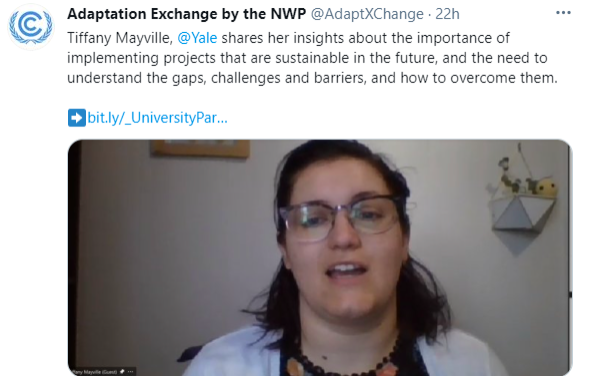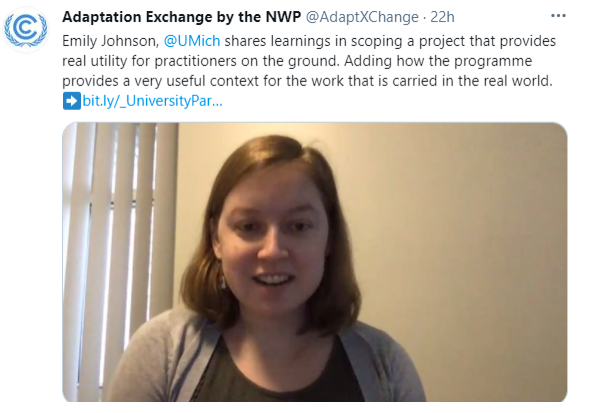Universities are critical hubs for research and teaching on climate change and have a huge potential to be partners in scaling up global action to build resilience. The UN Climate Change and Universities Partnership Programme is fostering cross-collaboration between graduate students and Nairobi Work Programme (NWP) partners for knowledge exchange and joint efforts on adaptation projects across the globe.
A learning event gathered students, partners and the secretariat staff to discuss the highlights and lessons learned from the three projects carried out by students at the University of Michigan and Yale University with engagement from three NWP partners.
The event provided an interactive platform to:
- Share insights and learning on the UN Climate Change and Universities Partnership Programme
- Showcase the recent projects
- Explore opportunities to use the partnership programme as a useful entry point to engage with universities in responding to specific knowledge needs of various UNFCCC constituted bodies and work programmes
Youssef Nassef, Director, Adaptation Division provided opening remarks where he emphasized that the NWP has an objective to advance knowledge, facilitate proper assessment of impacts climate change and subsequently support implementation of adaptation strategies.
“I see the UN Climate Change and Universities Partnership Programme as a win-win exercise both for the UN because we are benefiting from the insights on the ground level research and the experience from all of you, and also, I am hoping that it also benefits those who are engaged from universities in advancing certain issues that we know are policy relevant and in creating links with us and within the UN system”- Youssef Nassef.
Reflections from graduate students
Three projects were shared:
- Graduate students from the University of Michigan, School for Environment and Sustainability, addressed the challenges that the agriculture and food security sector of Namibia faces in adapting to climate change. A climate scenario planning tool kit was developed to support the implementation of climate smart agriculture. This project was supported by the University of Namibia.

- Recent graduates from the Yale School of the Environment examined ecosystem-based adaptation and water resources in Nepal and Peru. Their project underscored the relevance of Monitoring Evaluation and Learning systems for ecosystem-based adaptation (EbA) in collaboration with the International Union for Conservation of Nature (IUCN).

- The University of Michigan will examine the interface of climate change, biodiversity, and ecosystem services in the Hindu Kush Himalayan sub-region. Employing geographic information system techniques, the students anticipate their key outputs to be an environmental stratification model, geo spatial data, an interactive web map.

Technical support from NWP partners
NWP partners, namely Global Water Partnership Southern Africa, IUCN and ICIMOD (International Centre for Integrated Mountain Development) illustrated how this programme has been of interest to these respective organizations and highlighted the added value of collaborating with graduate students.
In conclusions, valuable reflections were shared by young professionals, NWP partners, and the secretariat staff which will be incorporated into scaling up the partnership Programme.
Further details
Find more details on the UN Climate Change and Universities Partnership Programme
here.
Follow the NWP Twitter account (@AdaptXChange) for regular insights
here.